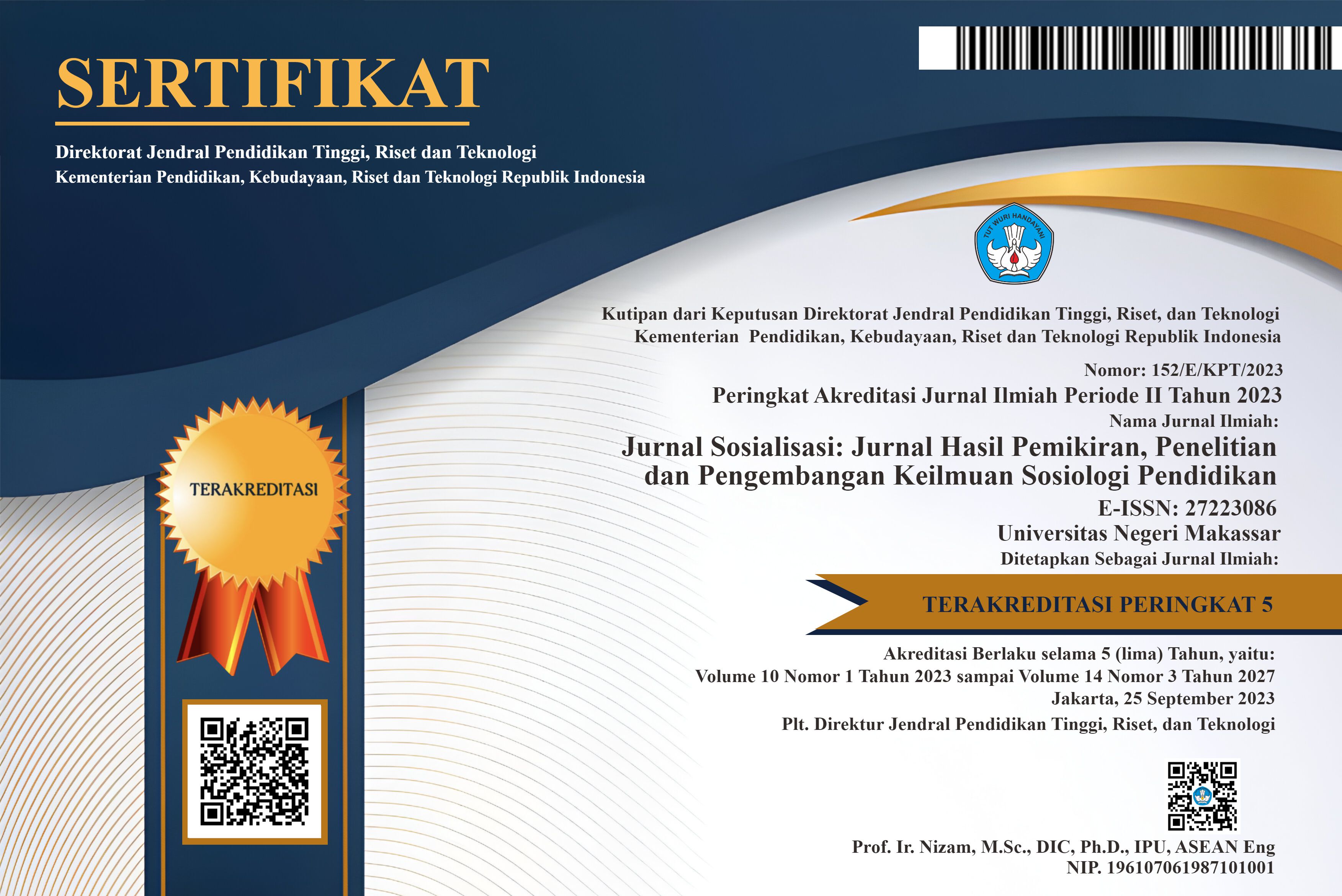Ecocentrism as Theoretical Framework for Environmental Ethics
(1) Pamo University of Medical Sciences Port Harcourt,
(*) Corresponding Author
DOI: https://doi.org/10.26858/sosialisasi.v1i2.34929
Abstract
Environmental ethics has emerged as the philosophical response to the threat of a looming environmental apocalypse. Aside from ethical issues arising from our relation to fellow humans, our survival and wellbeing and the wellbeing of generations after us depend on how we live with, what we do to, and how our lives affect other co-inhabitants of the earth like tigers, fishes, rivers and mangroves. Recent philosophical response to the ethics of environmental concern has led to the emergence of two model theoretical frameworks, anthropocentrism and ecocentrism. Indeed, all environmental philosophy can be divided into anthropocentrism and ecocentrism (Callicott, 1999), otherwise labelled secondary and primary environmental ethics (Rolston, 1988). Whereas the former seeks care for the environment from the perspective of its instrumental value to mankind, the latter approaches human relation to nature on the merits of nature’s inherent value. On our choice of which of these theories to build our environmental ethic depends how far we go in responding to the critical challenges posed by the depleting of natural resources, the loss of biodiversity, the menace of climate change and the spectre of global environmental degradation. This article exposes the ecocentric framework with the objective of outlining its essential elements, thereby making it accessible for philosophical appraisal. Beyond profiling the distinctive traits of ecocentrism, this article argues that its theoretical framework opens a new vista for moral philosophy, provides the radically new dimension in moral theory without which every prospect of an effective environmental ethics falters in want of an appropriate philosophical foundation.
Keywords
Full Text:
PDFReferences
Armstrong, S. and Botzler R (2003) eds. Environmental Ethics: divergence and
convergence. MCGraw Hill, NY.
Ariche, C. K and Obi, L(2018). “Environmental Sustainability and its Challenges in
Nigeria: The Way Forward” NDUNODE Calabar Journal of the Humanities, vol.14, no.1, pp 199-218.
Callicott, J. Baird (1989). In Defence of the Land Ethic: Essays in Environmental Philosophy. State University of New York Press, New York
………………(1999) Beyond the Land Ethic: More Essays in Environmental Philosophy, State University of New York, New York
……………….. “From the Balance of Nature to the Flux of Nature: The Land Ethic in a Time of Change” in Leopold and the Ecological Conscience, Knight, Richard L., and Suzanne Riedel, eds. J. B Callicott, ed., Wisconsin, the University of Wisconsin Press, 1987
……………(1989). “Environmental Education, Natural Aesthetics and ET” in In Defence of the Land Ethic: Essays in Environmental Philosophy, Albany, State University of New York Press.
……………(2013) Thinking Like a Planet: The Land Ethic and the Earth Ethic, New York, Oxford.
……………(2001). “Animal Liberation: A Triangular Affair” in Environmental Ethics: Readings in Theory and Application, Louis Pojman, ed., Belmont, Wadsworth,
……………….. (1994). Earth’s Insights: A Multicultural Survey of Ecological Ethics froom the Mediterranean Basin to the Australian Outback. University of California Press, Berkeley
Capra, F. (1983). The Turning Point. London: Fontana.
Carson, R.(2002). Silent Spring New York, Mariner Books, (first published 1962)
Cafaro, P. & Rachael C. (2002). Environmental Ethics: Worldviews vol.6 no.1 Brill, pp. 58-80
Ezedike, E. (2020). Environmental Ethics and Sustainability: An Introduction to
Environmental Philosophy. University of Port Harcourt Press. Port Harcourt
Francis, P. (2015). Laudato Si: On Our Common Home. Vatican Press, Rome.
Hargrove, E (1989). Foundations of Environmental Ethics. Prentice Hall, New Jersey.
Hayward, T. (1997). Anthropocentrism: A misunderstood problem. Environmental Values, 6(1), 49–63.
Jamieson, D. (2008). Ethics and the Environment: An Introduction, Cambridge University Press. Cambridge.
Katz, E. (1999). Envisioning a de-anthropocentrised world: Critical comments on Anthony
Weston’s ‘the incomplete eco-philosopher’. Ethics, Policy and Environment, 14, 97–
Kopnina, H., Washington, H., Taylor, B., and Piccolo, J. J., (2018). Anthropocentrism: More
than Just a Misunderstood Problem, in Journal of Agriculture and Environmental
Ethics. 31: 109-127.
Leopold, A. (1949). A Sand County Almanac: With other essays on conservation from Round
River. Random House, New York, NY, USA.
Moncrief, L. (2001). “The Cultural Roots of our Environmental Crisis” in Environmental
Ethics: Readings in Theory and Application, Louis Pojman, ed., Belmont,
Wadsworth.
Muraca, B. (2011). The Map of Moral Significance: A New Axiological Matrix for
Environmental Ethics. Environmental Values,20(3), 375-396. Retrieved September 4,
, from http://www.jstor.org/stable/23048368
Naess, A. (1973). The shallow and the deep, long-range ecology movement: a summary.
Inquiry: 95–100.
Nelson, M. (2010). Teaching holism in environmental ethics. Environmental Ethics. 32 (1):33-49.
Passmore, J (1974). Man’s Responsibility for Nature: Ecological Problems and Western
Traditions, Duckworth, London
Partridge, Ernest. (2002) “Ecological Morality and Nonmoral Sentiments” in Land, Value, Community:Callicott and Environmental Philosophy, Ouderkirk, Wayne and Jim Hill, eds.,
Albany, State University of New York Press.
Rees, W. (2001) “Sustainable Development: Economic Myths and Ecological Realities” in
Environmental Ethics: Readings in Theory and Application, Louis Pojman, ed.,
Belmont, Wadsworth.
Rolston, H. (1988). Environmental Ethics: Duties to and Values in the Natural World.
Temple University Press, Philadelphia.
Rowe, J. (1994). Ecocentrism and Traditional Ecological Knowledge. Available at
https://is.gd/rkSgP5(accessed March 2017).
Schaeffer, J. (2009). Theological Foundations for Environmental Ethics: Reconstructing
Patristic and Medieval Concepts. Georgetown University Press, Washington DC .
Sweitzer, A. (1925). Civilization and Ethics, in Pojman ed. Environmental Ethics: Readings
in Theory and Praxis.
Taylor, P. W. (1986) Respect for Nature: A Theory of Environmental Ethics. Princeton
University Press. New Jersey.
Tete, F. and Ariche, C. .(2021). Virtue Ethics as Philosophical Foundation for Environmental Education. GNOSI: An Interdisciplinary Journal of Human Theory and Praxis, 4(1). PP.83-90.
United Nations Environmental Programme (2011) Environmental Assessment of Ogoniland,
UNEP, Nairobi.
World Commission on Environment and Development (1987a) Our Common Future. Oxford
University Press, Oxford, UK.
Washington, H. (2013). Human Dependence on Nature: How
to help solve the environmental crisis. Routledge, London, UK.
Watson, R (1983). A Critique of Anti-Anthropocentric Ethics, in Environmental Ethics vol.5,
reprinted in Pojman, 162-167.
Wehrden, von H, Oheimb, von G., Abson, D. J., Hardtle, W. (2016). Sustainability and
Ecosystems in Sustainability Science, Heinrichs, H.et al. London, Springer.
Zimmerman, M. et al, (1993). eds., Environmental Philosophy: From Animal Rights to Radical Ecology New Jersey, Prentice-Hall.
Article Metrics
Abstract view : 1120 times | PDF view : 119 timesRefbacks
- There are currently no refbacks.

This work is licensed under a Creative Commons Attribution 4.0 International License.


































